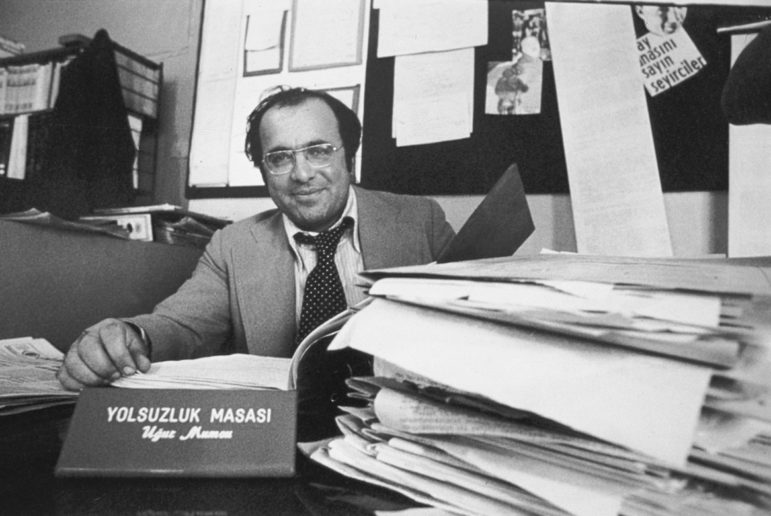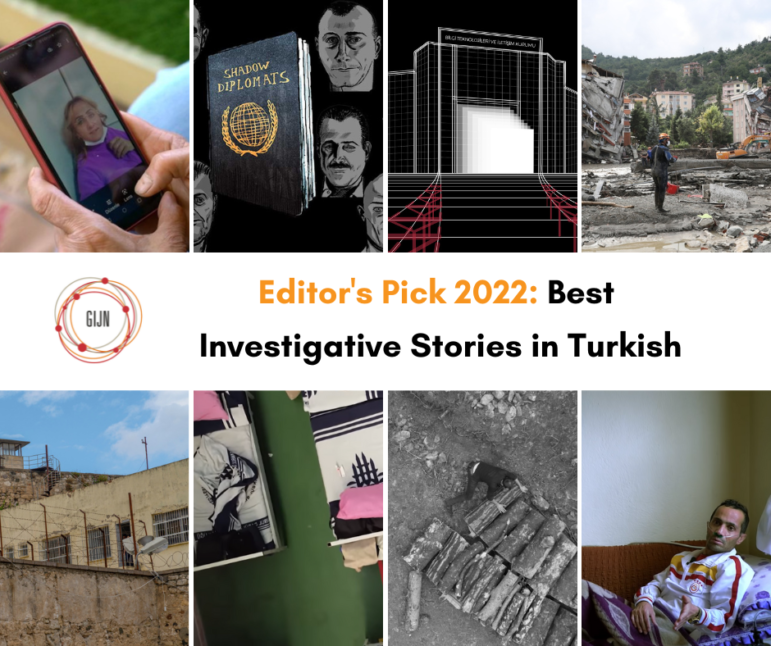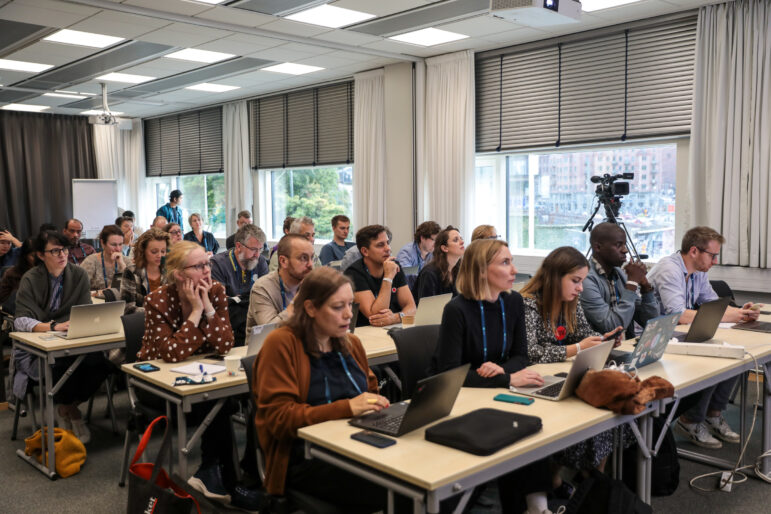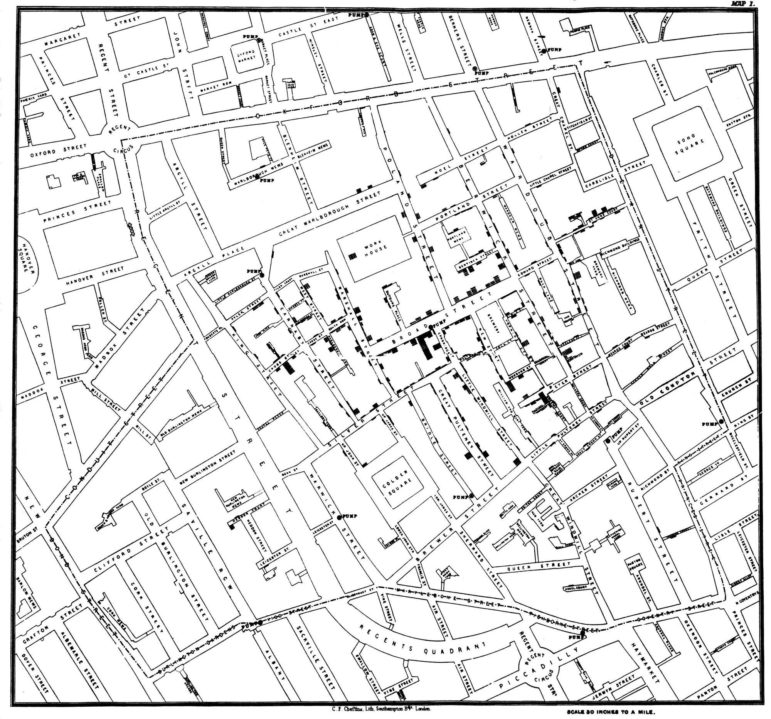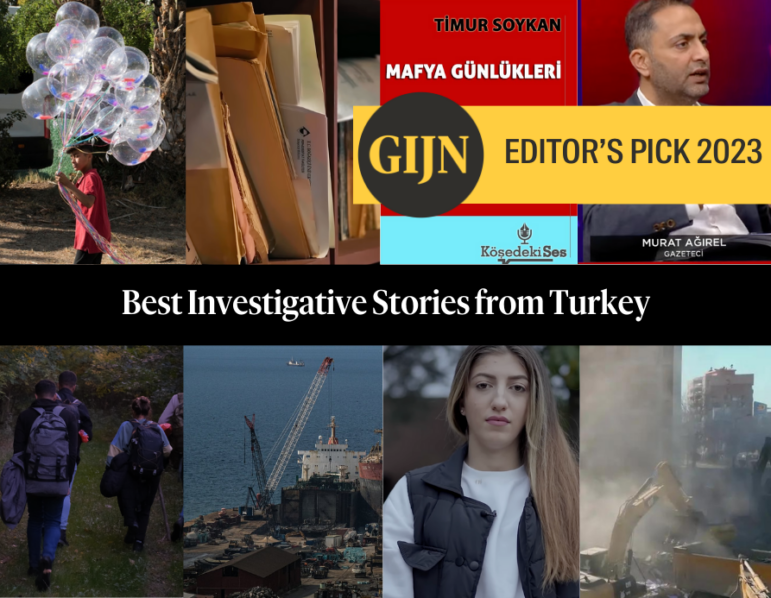

Image: GIJN
Counterfeit Cancer Drugs, Human Trafficking, and the Earthquake’s Toxic Aftermath: 2023’s Best Investigative Stories from Turkey
Read this article in
The latest World Press Freedom Index from Reporters Without Borders (RSF) placed Turkey far down the list this year — ranking it 165th out of 180 countries, having dropped 16 places from 2022, placing it below even Russia. According to the report, 90% of the national media in Turkey — which is officially called Türkiye — is now under government control. Some 15 journalists and media workers are currently in prison, according to the national journalists union.
The RSF report goes on to note how the “near systematic censorship on the internet [and] frivolous lawsuits against critical media outlets” have been used in a bid to “deflect attention from the country’s economic and democratic decline.” In addition, the country’s press corps faces a further challenge from a controversial disinformation law, which threatens three-year jail terms for reporters found guilty of intentionally publishing disinformation or “fake news.”
And yet, despite all this, GIJN found numerous praiseworthy stories produced by Turkish journalists this year. From exposing counterfeit cancer medication to an undercover report documenting how easy it is to access illegal drugs, and from an investigation on the dark side of the shipbreaking industry to a documentary detailing the background of the years-long resistance of academics at Boğaziçi University in their fight for academic freedom, the subjects were diverse. These investigations are also inspiring in terms of their investigative methods and the way they use video and audio footage.
* One story was published in 2022 after our last editor’s pick was published, so we include it here.
Fake Drugs: Counterfeit Cancer Medication

Investigative journalist Murat Agirel (left) speaks about the fake cancer drugs scandal and gives a “behind the scenes” account of the story. Image: Screenshot, Halk TV
When it comes to investigating Turkey’s fake drugs scandal, one reporter for Cumhuriyet, the country’s most established newspaper, drove this issue into the national spotlight. Murat Ağırel, an award-winning investigative journalist, started reporting on counterfeit medication after the Ministry of Health published a report confirming that fake cancer drugs had been sold in pharmacies and had even been administered to cancer patients. Ağırel ran with that report to further reveal that the problem was far from new. He followed up on complaints, analyzed previous reporting on this issue, and investigated how one supposed cancer drug seized from a particularly uncooperative hospital was actually just a painkiller. As well as newspaper reports, Ağırel also spoke about the investigation in detail on television. His persistence in pursuing this story meant it led the news agenda of Turkey’s biggest news TV channel for days, and forced the ministry to make a detailed statement.
Asbestos Lurks in Turkey’s Earthquake Zone

An earthquake-damaged site in Turkey where collapsed homes and buildings are being cleared. Image: Screenshot, Serdar Vardar for DW
The February 6 earthquake was the worst to hit the country in modern times, and killed more than 54,000 people in total, including in neighboring Syria. But after the rescue operation ended, there was more to dig into, figuratively. Deutsche Welle Türkçe reporters Pelin Ünker and Serdar Vardar investigated the mountains of rubble left after the quake to uncover the harmful presence of asbestos. Some 100,000 buildings collapsed during the earthquake, and it is estimated that between 116 and 210 million tons of rubble were left behind. The reporters found that, despite official claims to the contrary, toxic construction material had contaminated plants, soil, and rubble in this important agricultural region, signaling a serious and growing public health crisis. Evidence also came from dust samples collected by an expert engineering team — including from the tops of tents of those made homeless by the earthquakes — that were analyzed by an internationally accredited laboratory for the project. Other noteworthy reporting on this tragedy: an award-winning data project from Reuters that looked into the toxic dust left in the wake of the earthquake.
The Meth Predicament
At the heart of this video investigation, a simple question: how easy is it to get methamphetamine in Turkey? According to Tunca Öğreten, Murat Baykara, and Ömer Çakan from Voys Media, a video-based investigative journalism and documentary media platform, acquiring the drug can take less than an hour. The reporters discovered how meth is being sold over the internet and then bought the substance from a dealer reached via the Telegram app, while documenting the exchange with a hidden camera. In addition to undercover reporting, their documentary includes interviews with drug addicts and dealers to establish how simple it is to get hold of the drug, which gives users a euphoric high similar to crack cocaine. Among their findings: one teenage drug dealer they spoke with sells meth to between 80 and 100 people a day — to people from all walks of life — and the fact that this drug is routinely sold near addiction and rehabilitation centers.
Istanbul to EU: How Serbia Is a Visa-Free Gateway for Turks

Reporters from BIRN followed people making the journey from Turkey, through Serbia, and into the EU. Image: Screenshot, Yagiz Alp Tekin for BIRN
According to this investigation from Balkan Insight (BIRN), young people from Turkey are increasingly using Serbia as a transit point to enter the EU without proper migration documents, with human traffickers demanding fees of up to €2,400 euros (US$2,650) per person. (Visa-free travel is allowed between Turkey and Serbia, but not into the EU.) Investigative journalists Yağız Alp Tekin, Sasa Dragojlo, and Hamdi Fırat Büyük analyzed court records and interviewed migrants, smugglers, taxi drivers, and human rights experts to find out more about the journey, from first contact with the smugglers to finally reaching the critical borders of Hungary and Croatia. They found that social media sites like Facebook, TikTok, and WhatsApp are key to the process, while payments are made via clearing houses in Istanbul before migrants are transported to the EU border in northern Serbia. Another insight uncovered by the team: there are also people traveling through Turkey, who use the Serbia gateway with the use of fake Turkish ID cards.
The Mafia Diaries
The award-winning journalist Timur Soykan has spent years investigating the inner lives and operating methods of Turkey’s mafia. His book on the subject, “Battle of the Barons,” which dug into the existence of “ships full of heroin” and a “chain of assassinations” linked to Turkey’s narco-gangs, was updated this year, while his latest investigative pieces in the newspaper BirGün and in the dozen or so videos he has filmed continue to draw attention to the existence and impact of mafia organizations in Turkey. Soykan claims an influx of mafia members to Turkey has been made easier by a system in which the leaders of international criminal organizations have been able to buy citizenship, using illicit funds to buy houses and apartments, meaning that even if they are caught in Turkey, they are not extradited.
Shipbroken: Investigating ‘Lethal Practices’ at Turkish Shipyards
The Black Sea is a news outlet that specializes in in-depth and investigative stories from Turkey and across southeast Europe. In this investigation, reporters dug into reportedly dangerous conditions at a ship breaking yards, where former cargo ships are meticulously pulled apart to sell for scrap. Journalists Zeynep Şentek and Vedat Örüç documented the conditions in the Aliağa region of İzmir, a place at the heart of the shipbreaking industry, speaking to more than two-dozen former and current workers, safety officers, doctors, and experts, about safety practices at yards and in the industry as a whole. Their sources paint a picture of “rampant negligence” when it comes to worker safety, along with environmental concerns that workers are being exposed to toxic asbestos without adequate protection. While the use of asbestos on new ships has been banned since 2011, the pair found flaws in the ship dismantling process and that despite concerns on this issue, some shipyards have been signed off by the EU as providing suitable recycling facilities. Videos provided by sources showed how workers operate, with experts predicting that port staff could develop lung diseases including cancer, mesothelioma, and asbestosis if safety procedures related to asbestos removal are being flouted.
My Forgotten War
In this documentary podcast episode for the BBC, the Istanbul-based journalist Hannah Lucinda Smith investigated the deteriorating relationship between Syrian migrants and the local Turkish community in Esenyurt, a predominantly Syrian district about an hour’s drive from central Istanbul. She looked into the conditions for the Syrians living there — refugees who fled conflict in their own country many years ago — and whether the situation will ever be safe enough for them to return home. Although Turkey hosts the largest refugee and asylum-seeker population in the world — including around 3.6 million Syrians who escaped their native country’s civil war — the report explored why Syrian refugees feel forgotten and insecure, and how Turkey’s high inflation and other socioeconomic variables make life difficult.
Boğaziçi Resistance: The Story of the Fight for Academic Freedoms In Turkey
Boğaziçi is considered by many to be the best university in Turkey, and counts several former prime ministers among its notable alumni. But in a time when academic freedom is under threat, the university is facing a series of challenges. This documentary by Fayn, which was published in December last year, examined claims that prestigious departments have been dismantled — and leading academics pushed out of their roles — and probes how one rector was replaced with an appointee chosen by the Turkish president. As the filmmakers put it: “This intervention was met with resistance, which then turned into one of the longest civil disobedience protests in the history of the Republic. For supporters of the [Prime Minister Recep Tayyip] Erdoğan government, the university is right where it should be. For members of the resistance, one of the most important institutions in the country is about to be destroyed.”
 Pınar Dağ is the editor of GIJN Turkish and a lecturer at Kadir Has University. She is the co-founder of the Data Literacy Association, Data Journalism Platform Turkey, and DağMedya. She works on data literacy, open data, data visualization, and data journalism, and is on the jury of the Sigma Data Journalism Awards.
Pınar Dağ is the editor of GIJN Turkish and a lecturer at Kadir Has University. She is the co-founder of the Data Literacy Association, Data Journalism Platform Turkey, and DağMedya. She works on data literacy, open data, data visualization, and data journalism, and is on the jury of the Sigma Data Journalism Awards.










